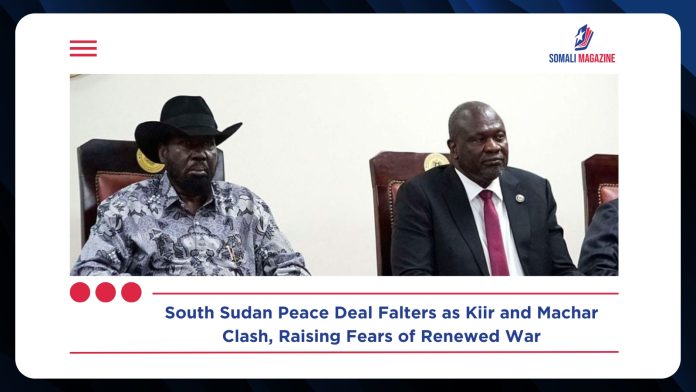Facebook Twitter (X) Instagram Somali Magazine - People's Magazine
South Sudan peace deal stalls with rivals locked in unending fights, as political tensions and military confrontations between President Salva Kiir and First Vice President Riek Machar threaten to unravel the fragile Revitalised Agreement signed in 2018. The truce, once hailed as a breakthrough in ending years of civil war, is now teetering on the edge of collapse amid escalating violence, arbitrary arrests, and deepening mistrust between the warring factions.
Recent reports from the Reconstituted Joint Monitoring and Evaluation Commission (RJMEC) and the United Nations reveal a grim picture of the deteriorating situation. Armed clashes have erupted across multiple regions, including Upper Nile, Luri, Rajaf, and Panyume, displacing over 130,000 people since March and disrupting humanitarian aid. Civilians, including women and children, have suffered death, injury, and forced displacement due to military operations and retaliatory attacks.
The arrest of Machar in late March, condemned by regional and international actors, has further strained the unity government. His detention, along with other senior opposition figures, violates key provisions of the peace agreement and has sparked fears of a return to full-scale conflict. RJMEC warns that the removal of opposition leaders from government positions without consultation is eroding trust and undermining the spirit of compromise that the peace deal was built upon.
The UN Commission on Human Rights in South Sudan has sounded the alarm, calling the situation “a humanitarian nightmare in the making.” It cited airstrikes on civilian areas, the recruitment of thousands of new soldiers outside agreed security reforms, and the involvement of foreign forces—including Ugandan troops—as signs of a brewing crisis.
Special Representative Nicholas Haysom told the UN Security Council that the political standoff between Kiir and Machar has degenerated into direct military confrontation, reminiscent of the deadly conflicts of 2013 and 2016 that claimed over 400,000 lives. He urged immediate action to prevent another descent into war, stressing that the peace agreement remains the only viable framework for stability and democratic transition.
Despite the bleak outlook, RJMEC maintains that there is still room for re-engagement. It has called for the unconditional release of detained leaders, the completion of force unification, and progress on the constitution-making process. With less than 20 months to go before the scheduled elections in December 2026, time is running out to salvage the agreement and restore public confidence.
The African Union and IGAD have been urged to intensify diplomatic pressure and leverage to bring the parties back to the negotiating table. Civil society groups, meanwhile, are calling for greater transparency, protection of civic space, and accountability for human rights violations.
As South Sudan stands at a dangerous crossroads, the international community faces a critical test: whether to act decisively to preserve peace or risk watching the world’s youngest nation slide back into chaos.

